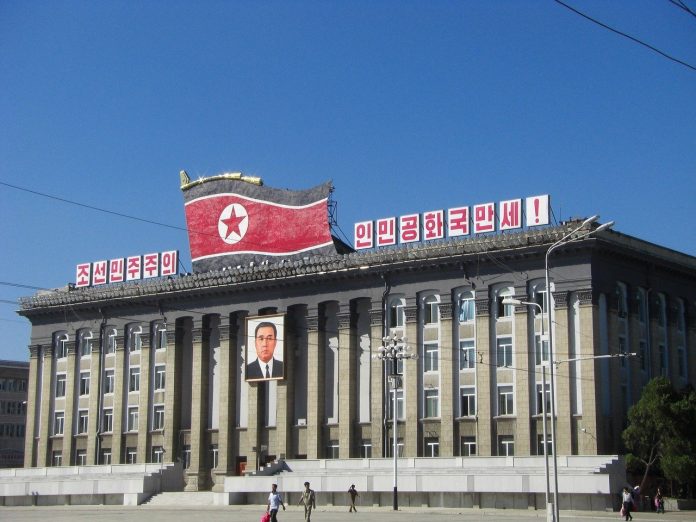The COVID-19 pandemic is not only consuming human life – as of now it has killed more than ninety-five thousand people around the world – but also is dealing a big blow to the global economy, sparking an unprecedented economic crisis. While the countries with strong economies are better placed to cope up with the crisis, the poor nations are likely to adopt unprecedented ways and means to recover and feed their people. A prime example is of North Korea, a poor and internationally isolated East Asian nation with a miniscule economy which might force it to initiate certain novel and unusual steps as an escape route from the economic crisis ignited by the coronavirus outbreak.
The North claims to have no positive case of the Covid-19, crediting its timely efforts taken for keeping the virus at bay. Nonetheless, the country will not be able to insulate its economy from the consequences of the fast spreading virus. That Pyongyang possibly sensed earlier and was one of the first countries to take steps to stop the spread of Covid-19. In late January, Kim Jong-un regime suspended foreign tourism and closed the borders with China and Russia – decisions which will have deep impact on the North’s economy.
Early estimates indicate that the coronavirus could reduce trade with Pyongyang’s largest trading partner, China apart from slowing its internal economic activity as the hermit nation loses access to the required external goods. Add to that, the potential domestic constraints on the country’s economic activity.
Pertinently with restaurants and factories closed in China, North Korean workers, who are employed in the country, have not been able to work for the past months. The North’s regime is reportedly insisting that its workers in China still pay their loyalty fees but generally we can assume that Pyongyang will lose access to this vital source of income so long as the quarantine remains in operation.
Moreover, North Korea’s domestic efforts to stop the spread of the coronavirus will also have economic consequences. What we don’t know is how restrictions on trade and domestic travel are impacting domestic markets, especially the ones that largely trade in domestically produced goods. Ultimately, this is not a situation that Pyongyang can control and its impact on the North Korean economy will likely depend on how long the coronavirus pandemic remains and how quickly the economy in China is able to bounce back.
Trade with China came to a standstill suddenly, leaving North Korean merchants unable to get goods from the country to sell in the North’s markets. This shortage caused a sharp rise in prices of items like flour and rice. Since then, authorities have imposed strict price limits to prevent prices from going out of control. And although the prices of some goods have gone down, the price of rice remains more expensive than usual.
Although most North Koreans can still get by, the situation is much worse in rural areas. A recent survey conducted by South Korea’s Ministry of Unification showed that nearly half of North Koreans are dependent on the private sector. This means that a good number of the residents must be facing hard times now given the border closure with China.
In view of the dismal economic scenario, the North’s central government, on March 25, instructed all provincial Party Committees to ask institutions such as schools, factories, and local security departments to acquire one month’s worth of food at their own expense. The order does not, however, apply to the country’s top-level officials or state security agencies. This shows the situation has become so bad that the state can no longer provide food rations to several significant institutions. This latest decision has caused further speculation about the true extent of the damage being done to the economy.
In this backdrop, Pyongyang will seek to boost its economy by undertaking such steps which can prove detrimental to peace and stability in the region. Kim Jong-un will be under pressure to meet the basic needs of the people to stay in power and so could explore the unusual options like selling his nuclear arsenal to save his country from the economic collapse.
Cybercrime is another option to minimize the economic shock of the coronavirus pandemic. Even prior to the border restrictions, UN Security Council sanctions had already heavily impacted North Korean exports. However, despite the cuts to Pyongyang’s exports, World Bank data shows that DPRK,s GDP has been rising steadily since 2015. This financial discrepancy can be explained primarily through North Korea’s illicit cyber operations, hackings and cybertheft.
If the regime intends to carry out nuclear test under the cover of COVID-19 pandemic, or launch missiles as it recently did possibly to suggest that everything is under control in the country, will prove detrimental for the regional peace and beyond. Moreover, that will be seen as Pyongyang’s heightened sense of apathy towards the coronavirus pandemic the world is facing, which will further alienate the international community from North Korea.
For North Korean leadership, the global economic crisis has presented a window of opportunity to launch a diplomatic compaign aimed at shepherding their country out of the morass of isolation for playing a significant part in international arena. It is essential for the North’s regime to announce suspension of its aspirations for garnering nuclear weapons, offer to go for denuclearization and ask for global aid and support at this critical juncture. With that goodwill gesture, Pyongyang will be seen as a responsible player promoting global solidarity and will reflect its sense of concern during the current crisis.
The views and opinions expressed in this article are those of the author.

Sheikh Shabir Kulgami is a Kashmiri (Indian) political commentator, analyst and columnist. He writes extensively on South Asia.


